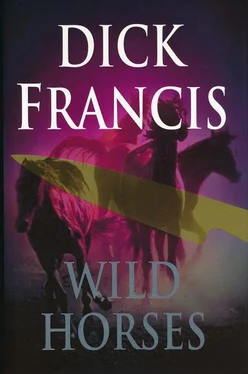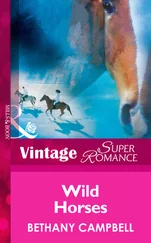She smiled ruefully. ‘Valentine says you were a real little devil when you were a boy. He said you ran wild.’
‘Only sometimes.’
She stretched up to kiss my cheek in farewell, and I gave her a sympathetic hug. She hadn’t lived in Newmarket when I’d been young and I hadn’t known her before coming back for the film, but she seemed already like a cosy old aunt I’d had forever.
‘I’m always awake by six,’ I said.
She sighed. ‘I’ll let you know.’
I nodded and drove away, waving to her as she stood in Valentine’s window, watching forlornly in her sorrowful vigil.
I drove to the stable yard we were using in the film and stood in the dark there, deeply breathing cool March evening air and looking up at the night sky. The bright clear day had carried into darkness, the stars now in such brilliant 3D that one could actually perceive the infinite depths and distances of space.
Making a film about muddy passions on earth seemed frivolous in eternity’s context, yet, as we were bodies, not spirits, we could do no more than reveal our souls to ourselves.
Spiritus sanctus. Spiritus meant ‘breath’ in Latin. Holy breath. In nomine Spiritus Sancti . In the name of the Holy Spirit, the Holy Breath, the Holy Ghost. As a schoolboy I’d liked the logic and discipline of Latin. As a man, I found in it mystery and majesty. As a film director I’d used it to instil terror. For Valentine, I’d usurped its power. God forgive me, I thought... if there is a God.
The mega-star’s Roller whispered gently into the yard and out he popped, door opened for him as always by his attentive chauffeur. Male mega-stars came equipped normally with a driver, a valet, a secretary/assistant and occasionally a bodyguard, a masseur or a butler. For female mega-stars, add a hairdresser. Either could require a personal make-up artist. These retinues all had to be housed, fed and provided with rented transport, which was one reason why wasted days painfully escalated the costs.
‘Thomas?’ he asked, catching sight of me in the shadows. ‘I suppose I’m late.’
‘No,’ I assured him. Mega-stars were never late, however overdue. Mega-stars were walking green lights, the term that in the film world denoted the capacity to bring finance and credence to a project, allied with the inability to do wrong. What green lights desired, they got.
This particular green light had so far belied his pernickety reputation and had delivered such goods that he’d been asked for in good humour and with sufficient panache to please his fans.
He was fifty, looked forty, and stood eye to eye with me at a shade over six feet. Though his features off-screen were good but unremarkable, he had the priceless ability of being able to switch on inside and act with his eyes. With tiny shifts of muscle he achieved huge messages in close-up, and the smile he constructed with his lower eyelids had earned him the tag of ‘the sexiest man in films’, though to my mind that smile was simply where his talents began.
I’d never before been appointed to direct such an actor, which he knew and made allowances for: yet he’d told me, much as O’Hara had, to get on with things and use my authority.
The mega-star, Nash Rourke, had himself asked for this night’s meeting.
‘A bit of quiet, Thomas, that’s what I want. And I need to get the feel of the Jockey Club room you’ve had built in the trainer’s house.’
Accordingly we walked together to the house’s rear entrance, where the night-watchman let us in and logged our arrival.
‘All quiet, Mr Lyon,’ he reported.
‘Good.’
Within the barn of a house the production manager, with my and O’Hara’s approval and input, had reconstructed a fictional drawing-room within the original drawing-room space, and also recreated the former trainer’s office as it had been, looking out to the stable yard.
Upstairs, removing a wall or two and using old photographs as well as a sight of the real thing, we had built a reproduction of the imposing room still to be found within the Jockey Club headquarters in the High Street, the room where, in the historic past, enquiries had been held, with reputations and livelihoods at stake.
Real official enquiries had for forty years or more been conducted in the racing industry’s main offices in London, but in Howard Tyler’s book, and in our film, a kangaroo court, an unofficial and totally dramatic and damning enquiry, was taking place within the old forbidding ambiance.
I switched on the few available lights, which gave only a deadened view of a richly-polished wood floor, Stubbs and Herring on the walls and luxurious studded leather armchairs ranged round the outer side of a large horseshoe-shaped table.
The constructed replica room, to allow space for cameras, was a good deal larger than the real thing. Also, complete with cornices and paintings, the solid-seeming walls could obligingly roll aside. Bulbs on ceiling tracks, dark now, waited with a tangle of floods, spots and cables for the life to come in the morning.
Nash Rourke crossed to one side of the table, pulled out a green leather armchair and sat on it, and I joined him. He had brought with him several pages of newly rewritten script which he slapped down on the polished wood, saying, ‘This scene we’re doing tomorrow is the big one, right?’
‘One of them,’ I nodded.
‘The man is accused, baffled, angry and innocent.’
‘Yes.’
‘Yeah. Well, our friend, Howard Tyler, is driving me crazy.’
Nash Rourke’s accent, educated American, Boston overtones, didn’t sit exactly with the British upper-class racehorse trainer he was purporting to be, a minor detail in almost everyone’s eyes, including my own but excluding (unsurprisingly) Howard’s.
‘Howard wants to change the way I say things, and for me to play the whole scene in a throttled whisper.’
‘Is that what he said?’ I asked.
Nash shrugged a partial negative. ‘He wants what he called “a stiff upper lip”.’
‘And you?’
‘This guy would yell , for Christ’s sake. He’s a big powerful man accused of murdering his wife, right?’
‘Right.’
‘Which he didn’t do. And he’s faced with a lot of stick-in-the-muds bent on ruining him one way or the other, right?’
‘Right.’
‘And the chairman is married to his dead wife’s sister, right?’
I nodded. ‘The chairman, Cibber, eventually goes to pieces. We established that today.’
‘Which Howard is spitting blue murder about.’
‘Tomorrow, here,’ I waved a hand around the make-believe courtroom, ‘you yell.’
Nash smiled.
‘Also you put a great deal of menace into the way you talk back to Chairman Cibber. You convince the Jockey Club members, and the audience, that you do have enough force of personality to kill. Sow a seed or two. Don’t be long-suffering and passive.’
Nash leaned back in his chair, relaxing. ‘Howard will bust a gut. He’s mad as hell with what you’re doing.’
‘I’ll soothe him.’
Nash wore, as I did, unpressed trousers, an open-necked shirt and a thick loose sweater. He picked up the sheets of script, shuffled them a bit, and asked a question.
‘How different is the whole script than the one I saw originally?’
‘There’s more action, more bitterness and a lot more suspense.’
‘But my character — this guy — he still doesn’t kill his wife, does he?’
‘No. But there’s doubt about it right to the end, now.’
Nash looked philosophical. ‘O’Hara sweet-talked me into this,’ he said. ‘I had three months free between projects. Fill them, he said. Nice little movie about horseracing. O’Hara knows I’m a sucker for the horses. An old real-life scandal, he tells me, written by our world-famous Howard, who of course I’ve heard of. Prestige movie, not a sink-without-trace, O’Hara says. Director? I ask. He’s young, O’Hara says. You won’t have worked with him before. Too damn right, I haven’t. Trust me, O’Hara says.’
Читать дальше












